| Srl | Item |
| 1 |
ID:
157621


|
|
|
|
|
| Summary/Abstract |
In the final analysis, it can be argued that whatever approach India adopts towards Sri Lanka, it will be impossible to alter two realities: the increasing presence of China and the anti-India sentiment which is deep rooted in that country. It should be kept in mind that since the pre-independence period, the Sri Lankans perceive India as wanting to dominate it economically as well as strategically. This feeling has not died down completely over time. Politicians and business communities have exploited these feelings over the years to pursue their selfish interests. And, they will continue to do so in the future too.
Thus, India’s aim is to protect its interests despite Chinese presence on the Island, and to create an atmosphere of interdependence so that the domestic anti-India constituency becomes less effective. For this, India needs to use the tools of both soft and hard power simultaneously. India has exhibited its capability as far as hard power is concerned. There is a growing realisation in Sri Lanka that as far as security assistance at the time of emergency is concerned there can be no better option than India. India’s proximity positions it as a country on which Sri Lanka can rely for immediate assistance. Hence, while Sri Lankan nationalists often oppose Indian economic activities in Sri Lanka, no such opposition was observed in the Island against the security cooperation between the two countries. Unfortunately, India failed to exhibit that it can be a reliable economic partner.
|
|
|
|
|
|
|
|
|
|
|
|
|
|
|
|
| 2 |
ID:
136797
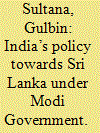

|
|
|
|
|
| Summary/Abstract |
As far as India’s foreign relations are concerned, it has been observed that regime change does not necessarily lead to the change of foreign policy. In most of the cases there is continuity. India’s relations with Sri Lanka under the United Progressive Alliance (UPA) government were marked by cooperation and understanding as well as disappointment and dissatisfaction.
|
|
|
|
|
|
|
|
|
|
|
|
|
|
|
|
| 3 |
ID:
169380
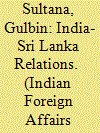

|
|
|
| 4 |
ID:
104613
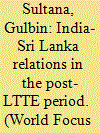

|
|
|
| 5 |
ID:
115907
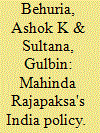

|
|
|
|
|
| Publication |
2013.
|
| Summary/Abstract |
Mahinda Rajapaksa has emerged as perhaps the only Sri Lankan leader who has managed to secure some strategic autonomy in conducting his country's foreign policy vis-à-vis India. He engaged India effectively during the military campaign against the Liberation Tigers of Tamil Eelam (LTTE) and simultaneously countervailed India by improving his country's relationship with India's traditional adversaries such as China and Pakistan. In the post-LTTE scenario, he has maintained a defiant posture vis-à-vis India over the latter's persuasion to evolve a political solution to the ethnic issue. Backed by a nationalist upsurge at home and support from countries such as China, he may continue with his policy of bypassing Indian pressures and persuasions in the coming days. Against this backdrop, the article raises the following questions and seeks to answer them. Does Rajapaksa's India policy signify a typical quest for strategic autonomy by a smaller state vis-à-vis a larger neighbour? Can this be explained as an effort to offset India's overwhelming influence on Sri Lanka? How is his 'India policy' different from that of other leaders? Does he display a unique style of leadership compared to his predecessors? How far has he succeeded in counterbalancing Indian influence? What are the reasons for his success or failure? What are the implications for India and how can he be effectively engaged?
|
|
|
|
|
|
|
|
|
|
|
|
|
|
|
|
| 6 |
ID:
156721
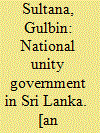

|
|
|
|
|
| Publication |
New Delhi, IDSA, 2017.
|
| Description |
48p.pbk
|
| Series |
IDSA Occasional Paper no. 47
|
| Standard Number |
9789382169772
|
|
|
|
|
|
|
|
|
|
|
|
Copies: C:2/I:0,R:0,Q:0
Circulation
| Accession# | Call# | Current Location | Status | Policy | Location |
| 059238 | 320.5493/SUL 059238 | Main | On Shelf | General | |
| 059239 | 320.5493/SUL 059239 | Main | On Shelf | General | |
|
|
|
|
| 7 |
ID:
139050
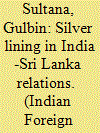

|
|
|
|
|
| Summary/Abstract |
With the election of Maithripala Sirisena as President of Sri Lanka, and the formation of the National Unity Government, it is expected that India’s southern neighbour will have a more democratic polity as compared to the earlier one. In addition, there is also a general popular expectation that, under the new government, there would be a greater balance in dealing with developmental issues in various constituent provinces of the island nation. There is also a general hope that there will be a thawing in the almost frozen India-Sri Lanka relationship. The Sirisena government is also likely to have a positive approach towards India, already indicated by the few initiatives that his government has taken. It will try to mend relations with India not necessarily by jettisoning its relations with China. A deft political calculation will be required by the Sirisena government on the issue of the implementation of the 13th Amendment, as it has the potential to cause a significant political loss by an upset Sinhala majority. The best way forward for Sri Lanka would be in following a middle path in its foreign policy, keeping in mind strategic concerns of an important neighbour like India.
|
|
|
|
|
|
|
|
|
|
|
|
|
|
|
|
| 8 |
ID:
145811
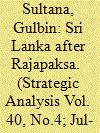

|
|
|
|
|
| Summary/Abstract |
Since the fall of the Mahinda Rajapaksa government, there has been an apparent foreign policy shift in Sri Lanka. There is a growing view that the new National Unity Government (NUG), which came to power in January 2015 with Maithripala Sirisena as President, has shown its proclivities towards India and the US and moved away from China, especially under Prime Minister Ranil Wickremesinghe. In fact, it is commonly believed that the new government is allowing the US and India to increase their influence on Sri Lanka, the same way as Mahinda Rajapaksa had allowed China to increase its presence in the country. However, this essay argues that while relations with the US and India have improved under the current government, it will not be easy for Sri Lanka to come out of the Chinese influence both because of its own economic compulsions—to a large extent engendered by the debt it has availed from China during the last decade—and paradoxically, also because of China’s continued zeal to stay engaged in the economic domain.
|
|
|
|
|
|
|
|
|
|
|
|
|
|
|
|
| 9 |
ID:
089648
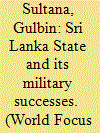

|
|
|
|
|
| Publication |
2009.
|
| Summary/Abstract |
On 19 May 2009 President Mahinda Rajapaksa formally announced the military victory of the Sri Lankan state over the LTTE. The article has attributed number of factors which contributed in great measure to the military successes of the Sri Lankan state. The military achivement of the Sri Lankan state, shows that if a war against terrorism is fought with strong determination, proper military programme and strategy and solid coordination and cooperation, it is not difficult to militarily eliminate the militant terrorism.
|
|
|
|
|
|
|
|
|
|
|
|
|
|
|
|
| 10 |
ID:
141585


|
|
|